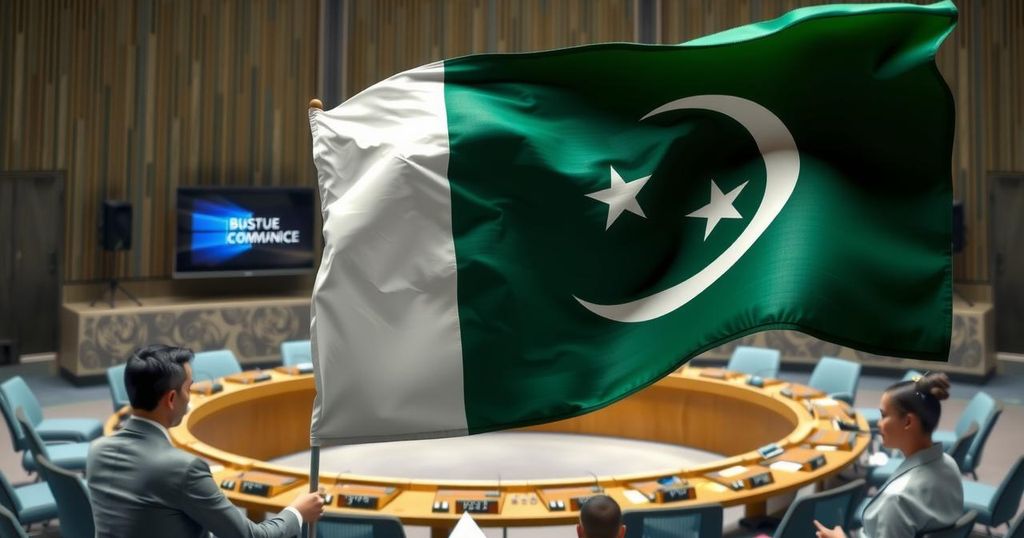Pakistan Begins Eighth Term as Non-Permanent Member of UNSC

Pakistan officially commenced its eighth term as a non-permanent member of the UNSC by installing its flag in front of the council chamber. Elected in June, Pakistan replaces Japan, occupying one of the Asia-Pacific seats and will preside in July. The country also joins the ISIS and Al Qaeda Sanctions Committee, reaffirming its commitment to international peace and collaboration in addressing global issues.
The flag of Pakistan was officially installed at the United Nations Security Council (UNSC) as the nation commenced its eighth term as a non-permanent member for the duration of 2025-2026. According to a press release from the Permanent Mission of Pakistan to the United Nations, this ceremony took place on Thursday, marking the beginning of Pakistan’s two-year commitment to the council. Elected earlier in June to succeed Japan, Pakistan will fill one of the two Asia-Pacific seats and is poised to preside over the council in July, a critical period for shaping its agendas and priorities.
This eighth term presents Pakistan with the opportunity to influence significant international discussions while also facing considerable challenges. The ceremony included the unveiling of flags for the five newly elected non-permanent members, including Denmark, Greece, Panama, and Somalia, replacing outgoing members Japan, Ecuador, Malta, Mozambique, and Switzerland. The installation of Pakistan’s flag was conducted by Ambassador Asim Iftikhar Ahmad, the country’s Alternate Permanent Representative.
In addition to its representation in the Security Council, Pakistan will hold a position on the Islamic State (ISIS) and Al Qaeda Sanctions Committee, which is responsible for identifying and imposing sanctions on designated terrorist organizations and individuals. The UNSC comprises 15 members, out of which five are permanent members (Britain, China, France, Russia, and the United States), while the remaining ten non-permanent seats rotate based on geographical representation each year.
Ambassador Ahmad expressed Pakistan’s dedication to the principles outlined in the UN Charter and emphasized the nation’s role as a staunch advocate for self-determination and international peace. During his speech at the UNSC ceremony, he remarked, “Pakistan will always remain a strong voice for peoples under foreign occupation and oppression and the realisation of their right to self-determination.”
He further stressed the importance of multilateral cooperation, with the United Nations at its nucleus, to tackle both existing and emerging conflicts. Ambassador Ahmad underscored the need for dialogue and diplomacy, stating that addressing the root causes of conflicts should be a priority to foster an environment conducive to peace, stability, and development. He asserted that Pakistan intends to collaborate with other members to seek equitable and peaceful resolutions to issues discussed during its term on the council, while also committing to uphold the UN Charter and international law consistently throughout their efforts.
The United Nations Security Council (UNSC) plays a crucial role in maintaining international peace and security through its legally binding resolutions. With 15 members, including five permanent members with veto power, the Council’s composition also includes ten non-permanent members whose positions rotate every two years. These non-permanent members are elected to represent different geographic regions, ensuring a diverse range of perspectives in discussions. Pakistan’s affiliation with the UNSC is significant, as it not only highlights the country’s commitment to international diplomacy but also allows it to participate actively in shaping policies on global security matters.
In conclusion, Pakistan’s installation at the United Nations Security Council as a non-permanent member signifies a pivotal moment for the nation, allowing it to assert its voice on the global stage while addressing pressing international issues. This opportunity comes with the responsibility of fostering peace and cooperation among nations, as highlighted by Ambassador Ahmad. By emphasizing multilateralism and adherence to the UN Charter, Pakistan aims to contribute effectively to discussions and resolutions during its tenure.
Original Source: www.dawn.com








